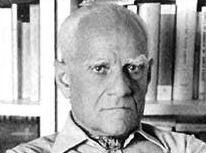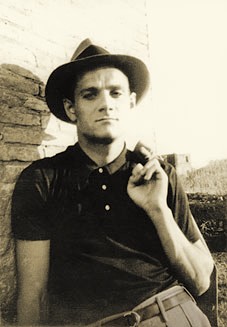
Alberto Moravia
 Alberto Moravia
Alberto Moravia
"It was only a question of months, he said, before the Germans would be completely defeated, and then it would be all up with him, and at this point he made a gesture that froze my blood, putting his hand up to his neck, as much as to say that the Russians would cut his throat." � Alberto Moravia
 Alberto Moravia |
 Alberto Moravia
Alberto Moravia
|
|
The negative image. Many Ukrainians served in the German armed forces during World War II, though as a proportion of the total Ukrainian population, with a lower participation rate than in the case of such countries as France, Belgium, or the Netherlands. The image of the Ukrainian collaborator that is currently being disseminated by the media is one of a bull-necked sadist shoving Jews into gas chambers, and as opportunity permitted, disembowelling them with his sword while doing so, or smashing in their skulls. Assumption of universality of the negative image. This is not only an image that is being disseminated, it is the only image. It is the image, furthermore, relied upon in war crimes proceedings � that a Ukrainian who served under the Nazis must necessarily have been guilty of war crimes and crimes against humanity. The working assumption on the part of prosecutors is that no particular crimes need be attributed to him as an individual, since all such Ukrainians, with dependable uniformity, can be assumed to have committed similar crimes. A positive image. An alternative view is that an extreme image such as that painted above may never have been realized in actuality. The typical case may have been a Ukrainian boy � in his teens or barely out of his teens � who had experienced the horrors of Communism at first hand, and chose to side with whatever force at the moment appeared in opposition to Communism. The nature of that force � Nazism in this case � was not disclosed to him at the time of his decision. How could it have been? This Ukrainian boy was typically captured during the early stages of the invasion of his country, was not a daily reader of the New York Times, was not briefed by the Nazi high command as to the aims of the war or the methods that would be employed in its prosecution. He typically volunteered � or was conscripted, or led away at gunpoint � in the expectation of being thrown into the fight against the Soviet army, and may have later been frustrated to discover that he was being assigned to serve in some more mundane capacity, as in the guarding of bridges or warehouses or work camps, as was the case with some Latvian volunteers. His participation on the German side is in no way culpable, and the sight of him being prosecuted half a century later serves only to reveal the perversion of the justice system within the country prosecuting him. From a historical novel. The passage below is taken from Alberto Moravia's novel Two Women. This is the novel that was made into the Sophia Loren film of the same name, though as typically happens, the film is unable to reproduce the rich detail of the novel. Although Two Women is fiction, I take it to be historical fiction, faithful to the events of the time, rich in the sort of surprising detail that might have been observed by an eyewitness but that would be beyond the powers of anyone to imagine. The passage below portrays the situation of a Ukrainian who had defected from the Soviet army, and was now serving with the German forces in Italy. The image may not be of a Ukrainian. Is this collaborator really Ukrainian? Moravia does not say so. The collaborator is referred to as Russian, but this appears to be only because it was the Soviet army that he defected from, and this Soviet army might conventionally have been referred to as the "Russian army," just as it is today throughout the English-speaking world. The collaborator describes himself as "being from some very distant country" which the Sophia Loren character finds difficult to remember � "he said the name but I cannot remember it" � thus, his country of origin was not Russia, as "Russia" would have been easy to remember. He says, furthermore, that he defected because he "did not care for the Russians." But if he himself had been Russian, he would more likely have said that he did not care for the Communists, or did not choose to fight on the side of the Communists. Finally, as this collaborator is blond, he is likely of Viking descent, and thus European rather than being from the Asiatic regions of the Soviet Union. Thus, in all probability, this collaborator is not Russian, and as Ukrainians constituted the second-largest ethnic category within the Soviet army, there is a good chance that he is Ukrainian. The collaborator's nationality is beside the point. However, whether he is Ukrainian or something else � Latvian, Czech, Polish, whatever � is irrelevant. Whatever nationality we take him to be, our conclusions will be the same. Those conclusions are: (1) that the typical collaborator may have been motivated to fight Communism; (2) that Nazism appeared on the scene as the only force available to defeat Communism; (3) that upon later observing the characteristics of Nazism, the typical collaborator may have become disillusioned; (4) that during his service, the typical collaborator may have committed no war crimes or crimes against humanity; and (5) that the typical collaborator may also have been aware that in the event of the defeat of the German forces, he would be forcibly returned to the Soviets, and there murdered by the Jewish-dominated NKVD. A war of images. The struggle that the Ukrainian community has been drawn into is one of the ascendency in public consciousness of images. The enemies of Ukraine attempt to implant a single, unvarying, and erroneous image of what the typical Ukrainian collaborator was like and how he passed the war years. The contrasting image below, though taken from fiction, is a more representative one, and should be offered to the public as an alternative to the false one being disseminated today. The default image should be positive. More importantly, war crimes proceedings against septuagenarian and octogenarian Ukrainians should start with an image of a blameless collaborator such as the one below as the image which constitutes a presumption of innocence. War crimes proceedings should lend credence to any more culpable image not gratuitously as they do today, but only upon the presentation of hard evidence. These Ukrainian collaborators are not people that Jewish groups should today be prosecuting � rather, they are the victims of both the Communists and the Nazis. They are fellow victims with whom Jews should be sharing the reparations that they have won and continue to win for their own victimization during the war. I introduce paragraphing. The original of the Alberto Moravia passage below was one solid block of text. I have taken the liberty of chopping it up into five paragraphs. |
|
We turned into the main road, and a little farther on had our first encounter. A man was leading two brown, well-fed horses � very fine ones � along the road. These two horses were German but the man was wearing a uniform I had never seen, and, as soon as we caught up with him, he first looked at us, then gave us a greeting, and then, since we were going the same way, started a conversation in his odd, halting Italian; and so we walked along, talking together. He was a man of about twenty-five, and of a beauty such as I have seldom seen in my life. He was tall, with broad shoulders and a slim waist almost like a woman's, graceful, and with long legs in yellow hide jack-boots. His hair was fair as gold, his eyes of a color between green and blue, almond-shaped, strange and rather dreamy, his nose straight, large and delicate, his lips red and well-cut; and when he smiled he showed very beautiful teeth, white and regular and a pleasure to look at. He told us he was not German but Russian, from some very distant country; he said the name but I cannot remember it. He said quietly that he had betrayed the Russians for the Germans because he did not care for the Russians; however he did not at all love the Germans either. He told us that he himself, together with other Russians who were also traitors, was attached to German headquarters for fatigue duties. He also said he was certain that the Germans would lose the war because they had disgusted the world with their cruelty and the whole world had turned against them. It was only a question of months, he said, before the Germans would be completely defeated, and then it would be all up with him, and at this point he made a gesture that froze my blood, putting his hand up to his neck, as much as to say that the Russians would cut his throat. He spoke calmly, as though his own fate were by now a matter of indifference, and he even smiled, not only with his mouth but with those strange, cerulean eyes which looked like two little pieces of the deepest part of the sea. It was clear that he hated the Germans and the Russians and even himself, and that death was of no consequence to him. He walked quietly along, holding the two horses by their bridles; and on that deserted road in the grey, frozen countryside there was nothing to be seen but him and his horses, and it seemed incredible that this very beautiful young man should be already condemned and should have to die soon, probably before the end of the year. At the fork in the road, where we parted, he said again: "These two horses are all that I have left in life and they're not even mine." Then he went off in the direction of the town. We watched him for a moment as he walked away, and I reflected that here was another effect of the war. If there had not been a war, this handsome young man would have stayed in his own country and would probably have got married and had a job and become a good, honest man like many others. The war had made him leave his country and had made him turn traitor, and now the war was going to kill him and he was already resigned to death and this, among so many terrible things, was perhaps the worst of all, for it was the least natural and the least comprehensible. Alberto Moravia, Two Women, Farrar, Straus and Cudahy, New York, 1958, pp. 191-193, translated from the Italian by Angus Davidson |